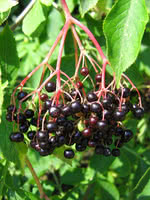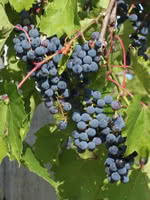Mon-Fri 9am - 5pm Mountain time
Black Elderberry vs Frontenac Grape
Sambucus canadensis
Vitis x Frontenac
NOT AVAILABLE THIS SEASON - MIGHT RETURN
NOT AVAILABLE THIS SEASON - MIGHT RETURN
Black Elderberry is a deciduous shrub native to eastern North America. You can plant this shrub in moist areas and it will help stabilize your soil. You can also use it on rural properties anywhere you'd use a lilac.
Black Elderberries are considered to be partially self-pollinating. So while they will still produce some berries without cross-pollination, planting with another variety will increase yields. Consider planting with Ranch Elderberry or Bob Gordon Elderberry.
Warning: the seeds, stems, leaves, roots, and uncooked berries of the Black Elderberry are poisonous to humans when eaten in quantity. You should cook the berries to make them safe for human consumption.
Frontenac Grape is a prairie hardy climbing vine that produces juicy, flavorful grapes. Expect aromas of cherry, plum, and berry from the wine and juice you make from this grape.
Note: if you want grapes for fresh eating, you might want to look at Brianna or Valiant Grape.
This vine requires a fence or trellis to encourage upward and outward growth. Consistent pruning and maintenance is necessary to reliably produce fruit, which usually occurs between 3 and 4 years of age.
Note: We do not ship grape vines to BC due to regulatory restrictions from the Canadian Food Inspection Agency.
Black Elderberry Quick Facts
Frontenac Grape Quick Facts
Toxicity: leaves, stems, and uncooked berries are poisonous to humans

